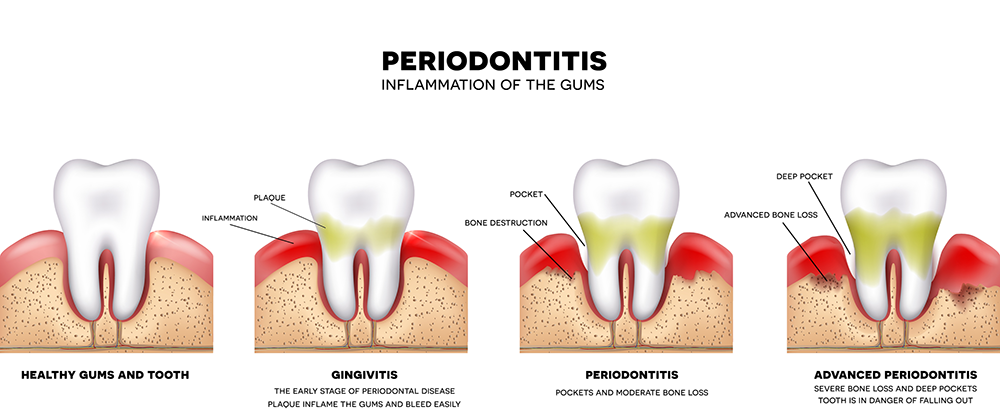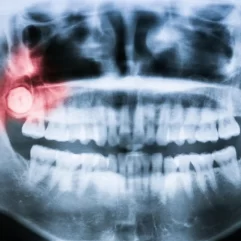The Impact of Anaerobic Bacteria on Periodontal Disease
Understanding the Causes and Treatment of Gum Disease
In the complex ecosystem of the human mouth, there are hundreds of different types of bacteria, each with a unique role in oral health. Among these microorganisms, anaerobic bacteria are the leading cause of periodontal disease, commonly known as gum disease or historically referred to as pyorrhea.
When not properly controlled, these anaerobic bacteria can create a sticky biofilm around the teeth, causing inflammation and infection of the gums. As the disease progresses, the balance of the supportive structures around the teeth – such as the gums, bones, and ligaments – becomes compromised, ultimately leading to a risk of tooth loss.
Beyond the oral consequences, gum disease can also have broader effects on an individual’s overall health. However, maintaining healthy teeth and gums is essential for preventing systemic issues and enhancing quality of life. It is important to note that periodontal disease may not always affect the entire mouth, sometimes only impacting a specific area or a few teeth.
Several factors contribute to the buildup of anaerobic bacteria that trigger periodontal disease, including genetic predispositions, smoking habits, poor oral hygiene practices, and certain autoimmune disorders. Recognizing early signs of the disease, typically seen as gingivitis, is crucial for timely intervention and preventing further complications. Regular dental check-ups are recommended to evaluate gum health and promptly address concerns.
Our clinics in Mexico prioritize comprehensive periodontal care, with a dedicated periodontist on staff. Our specialized treatments for periodontitis are practical and more cost-efficient compared to similar services in the United States. Investing in your gum health today can result in improved oral and overall well-being in the future.
A Periodontal Dental Evaluation
It is estimated that 80% of adults have some form of gum disease. Periodontal disease can go unnoticed by many, as symptoms may not be immediately visible. Gum pockets can develop quickly in the molars, which are harder to see and may require a dental professional to detect. Having recent full mouth X-rays to check for bone loss is crucial. X-rays and a thorough examination by a dentist are essential to evaluate overall gum health and determine if treatment for periodontitis is necessary.
A periodontal probe will be used to measure gum spaces during the examination. Healthy sulcus measurements should be 1-3 mm, while anything over 4 mm indicates inflammation or pockets. Many are unaware that the gums are not directly attached to the teeth at the gumline. The sulcus is the space between the gum line and tooth, around 1-3 mm deep, where anaerobic bacteria can gather. If plaque builds up under the gum line, the sulcus can deepen, forming periodontal pockets.
Signs and Symptoms of Gum Disease to Watch Out For
Recognizing the signs of gum disease early on can be crucial in preventing further complications. Some symptoms that you may notice on your own that may indicate the need for periodontitis treatment include persistent bleeding or redness of the gums, aching or swelling of the gum tissue, the presence of periodontal abscesses on the outside of the gums, chronic bad breath or an unpleasant taste in your mouth, gum recession where the gums pull away from the teeth, visible buildup of tartar on the teeth, and teeth that start to feel loose.
Persistent bleeding or red gums are often the first indicators of gum disease, which is usually caused by inflammation and infection of the gum tissue. Aching or swollen gums can also be a sign of infection and should be evaluated by a dentist promptly. Periodontal abscesses, which are pockets of pus that form on the outside of the gums, can be painful and may indicate a more severe infection.
Chronic bad breath or a persistent unpleasant taste in the mouth can be caused by the buildup of bacteria in the gums and pockets between the teeth, which are common in cases of gum disease. Recession of the gums can lead to the exposure of the tooth roots and may be a sign of advanced gum disease.
Visible tartar, which appears as a yellowish or brownish hardened plaque on the teeth, indicates poor oral hygiene and an increased risk of gum disease. Finally, the feeling of loosening teeth can be a late-stage symptom of gum disease, indicating significant damage to the supporting structures of the teeth.
If you notice any of these symptoms, it is essential to seek professional dental care promptly to assess the extent of the disease and determine the appropriate periodontitis treatment plan to prevent further damage to your oral health.
Possible Links to General Health and Periodontal Disease
The health of our mouth is intricately connected to our overall well-being, with increasing evidence suggesting that periodontal disease, commonly known as gum disease, may be linked to various general health conditions. Periodontal disease is a chronic inflammatory condition that affects the gums and supporting structures of the teeth. It is caused by the buildup of plaque, a sticky film of bacteria, on the teeth and gums.
Research has shown that individuals with periodontal disease may have a higher risk of developing certain systemic health conditions. One possible link is with cardiovascular diseases, such as heart disease and stroke. Studies have suggested that the inflammation and infection associated with gum disease may increase the risk of heart disease by contributing to the narrowing of blood vessels and forming blood clots.
Moreover, there is growing evidence of an association between periodontal disease and diabetes. People with diabetes are more prone to gum infections, and uncontrolled diabetes may worsen the progression of gum disease. Individuals with diabetes are also at a higher risk of developing severe forms of periodontal disease.
Furthermore, pregnant women with untreated gum disease may be at risk of adverse pregnancy outcomes, such as preterm birth and low birth weight. Hormonal changes during pregnancy can make the gums more susceptible to inflammation, increasing the risk of gum disease. Expectant mothers must maintain good oral hygiene practices to reduce the risk of pregnancy complications.
In addition, ongoing research investigates the potential links between periodontal disease and other conditions, including respiratory diseases, rheumatoid arthritis, and Alzheimer’s disease. While the exact mechanisms behind these associations are not fully understood, maintaining good oral health is essential for overall health and well-being.
Preventing and managing periodontal disease is crucial in reducing the risk of developing associated health conditions. Good oral hygiene, including regular brushing, flossing, and dental check-ups, can help prevent gum disease and maintain oral health. In cases of existing periodontal disease, professional treatment by a dentist or periodontist may be necessary to control the infection and prevent further damage to the gums and teeth.
Overall, the connection between general health and periodontal disease underscores the importance of oral health as an integral part of our overall health regimen. By recognizing the potential links between gum disease and systemic health conditions, we can work towards better oral health practices and improve our overall well-being.
Treating Periodontal Disease
Periodontitis is a serious condition that requires proactive intervention to prevent further progression and damage to the gums and supporting structures of the teeth. It is essential to understand that periodontitis will not improve independently and that seeking professional dental care is crucial in addressing the disease effectively.
Non-Surgical Treatments:
Combining a diligent oral hygiene routine at home with the expertise and guidance of dental professionals can significantly improve the outcomes for individuals with gum disease. Regular brushing, flossing, and antimicrobial mouth rinses can help control plaque buildup and reduce inflammation in the gums. However, additional treatments may be necessary for more advanced cases of periodontitis to achieve optimal oral health.
Depending on the severity of the gum disease, dental professionals may recommend various periodontitis treatments. These treatments are tailored to the individual’s specific needs and may involve a combination of non-surgical and surgical interventions. Non-surgical treatments, such as scaling and root planing, aim to remove plaque and tartar buildup from the teeth and root surfaces, promoting gum healing and reattachment. This procedure can be highly effective in managing the early stages of gum disease and preventing its progression. This is a non-invasive approach, with minimal discomfort after the procedure. Warm salt water rinses and over-the-counter pain medication can help any soreness.
Surgical Intervention:
In cases where non-surgical treatments are insufficient to address the severity of periodontitis, surgical interventions may be recommended. Surgical treatments for gum disease may include pocket reduction surgery, gum grafting, bone grafting, or guided tissue regeneration. These surgical interventions aim to restore the health and function of the gums by addressing deeper pockets of infection and promoting tissue regeneration.
It is important to note that oral rinses and medications alone are not effective in treating gum disease. They should be used as adjuncts to professional dental care and comprehensive treatment plans. The success of periodontitis treatment depends on a collaborative effort between the patient and their dental care team, focusing on maintaining good oral hygiene practices and attending regular dental check-ups.
By understanding the necessity of proactive treatment and the range of options available, individuals with periodontitis can take steps to manage their condition effectively and improve their oral health and overall well-being. Seeking intervention and following through with recommended treatments can help reverse the effects of gum disease and prevent its long-term consequences.
Periodontal Maintenance
Plaque, a sticky film of bacteria, continuously forms on our teeth’ surfaces. The risk of periodontitis recurrence is significantly higher for individuals prone to aggressive gum bacteria. Research has shown that anaerobic bacteria, which thrive in low-oxygen environments like the gums, can become active within three months of initial treatment for periodontitis. This highlights the importance of ongoing dental care to prevent the re-emergence of gum disease.
Following treatment for periodontitis, it is essential to establish a regular maintenance schedule with a dental professional. A three-month prophy recall, which involves professional cleanings and evaluations, can help monitor the gums’ health and prevent gum disease progression. These regular appointments allow dental professionals to assess the effectiveness of home care routines and provide personalized recommendations for maintaining optimal oral health.
The success in preventing further gum disease largely depends on the individual’s commitment to at-home oral care practices. In addition to regular brushing and flossing, incorporating tools such as water picks, battery-powered or ultrasonic toothbrushes, and dental toothpicks into the oral hygiene routine can enhance plaque removal and promote gum health. Adapting to home care advice provided during dental cleanings can help individuals effectively manage their gum health and reduce the risk of periodontitis recurrence.
Proper hygiene practices can positively impact overall well-being, as oral health is closely linked to systemic well-being. Oral care in one’s overall health routine can improve quality of life and reduce risks of associated health conditions.
Periodontists at Mexico dental clinics offer comprehensive evaluations and affordable treatment options for individuals seeking specialized care for periodontal disease. By consulting with experienced dental professionals, individuals can access tailored periodontitis treatments at a fraction of the cost compared to specialists in the United States. If you suspect that you may benefit from periodontitis treatment, do not hesitate to reach out to our team for expert guidance and personalized care. Taking proactive steps to address gum disease can safeguard oral health and improve overall well-being.
If you have questions or need additional infwell-being please Contact Us or Request a Quote to send us your dental inquiry, and we’ll get back to you.












